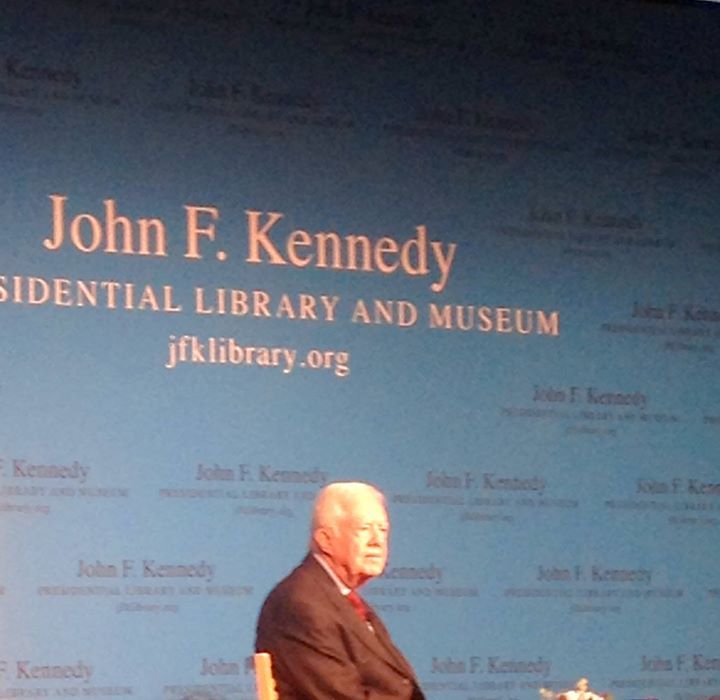“It was a life changing moment to have the chance to attend such an educational talk with the 39th president of the United States,” said Undergraduate Student Government president Ignacio Chaparro. “You could feel his passion for social justice. You could revive the past from his speech. You could see his commitment to the advocacy of women’s rights,” he added.
Chaparro was one of the many University of Massachusetts Boston students who attended the discussion with former United States President Jimmy Carter, when he discussed his new book A Call to Action: Women, Religion, Violence, and Power at the John F. Kennedy Presidential Library and Museum on Nov. 20.
During the conversation, Carter also spoke about health care, ethics and U.S. foreign policy, and his fond memory of the library and former president John F. Kennedy.
President Carter decried abuse of women and girls as “pervasive,” especially in some foreign countries where gender mutilation is a norm. He mentioned that in Egypt 91 percent of all the females have been mutilated. “Their sexual organs are removed. All the exterior parts of it,” he explained. In Somalia and Dubai 97 percent of all the females are mutilated, and over 50 percent in around 30 countries in Africa.
President Carter invites everyone to take a stand against women’s ill-treatment and deprivation of equal opportunities. “When men and women work full time, in America men are paid an average of 23 percent more,” he stated.
He challenged the culture of silence around women suffering and discrimination in the United States. “Men do not protest because they benefit from it,” he pointed out.
President Carter, who has also been a worldwide champion of human rights, called for justice and peace for people in Gaza. “My main prayer is to bring peace to Israel but we have to do justice and fairness to the people of Palestine,” he said. “I have been to Gaza in 2008 and in 2009, and almost every school and hospital were completely destroyed, including more than 18000 homes.”
Carter added that there is no need to keep striking on an already deserted place like Palestine. He believes that the best way to bring peace between those two states is through dialogue and diplomatic action; not by military intervention and bombardment.
Indeed, President Carter also believes that it is possible to conduct foreign policy that protects U.S. national interests and is guided by moral and ethical values. “I do not think there is any incompatibly between basic religious values, moral values, ethical values, the universal declaration of human rights, the Geneva convention, and the conduct in foreign policy,” Carter stated.
“I think we can have a foreign policy that aims at providing peace, [shelter to the homeless and food to the hungry],” he said. Carter continued to say that families in war torn countries in Africa are yearning for those things, which “are all basic humans rights.”
President Carter has received numerous awards and accolades for his advocacy for peace and human rights. In 1998 he received the United Nations Human Rights Prize, given in honor of human rights achievement. He was also awarded the 2002 Nobel Peace Prize. Under his presidency, the United States never went to any war. Never dropped a bomb. Never even fired a bullet.
“This is amazing,” said UMass Boston political science major Gabriela Coletta. “[President Carter] embodies the values and the ideals that I identify myself with,” she said. Coletta claims that she is also a proponent of peace, equality, decency and equity for everyone.
Along the same lines, Fahim Sinha, a cabinet member of the Undergraduate Student Government at UMass Boston, echoed Coletta’s wonderment. “I was struck by his [thoughtful] approach on foreign policy,” he stated. Sinha went to explain how there were so many challenges for U.S. foreign policy makers in the 70’s and 80’s, especially after the Vietnam and with all of the potential threat posed by Iran. Sinha greatly admired Carter’s tranquil handling of his presidency and believed his leadership during the period to be remarkable.
Sinha is a junior majoring in international relations. He expressed his hope at continuing to have the opportunity to attend educational events at UMass Boston’s surrounding institutions. He believes that it is important for the UMass Boston community members to have access to the JFK Library and Edward M. Kennedy Institute in order to create a greater sense of community.





















































